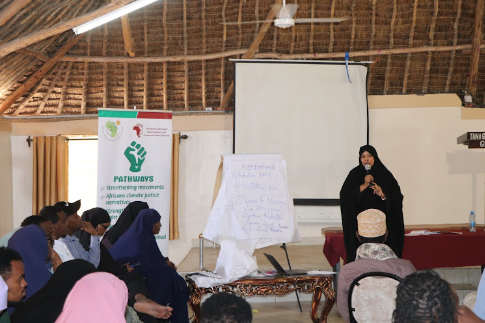Environmental activists in Garissa are emphasizing the urgent need to address climate change before it’s too late. Recent events, they argue, underscore the necessity for immediate action, as flooding in the area has resulted in loss of life and extensive damage to homes, infrastructure, and property worth millions.
These concerns were raised during a meeting at a local hotel, which brought together environmental activists, county leadership, youth-led organizations, women, and research institutions. The meeting was organized by Womankind Kenya, as part of a five-year project funded by the African Women’s Development and Communication network, focusing on three sub-counties: Garissa township, Masalani, and Balambala.
Haretha Aden, a climate change resilience officer at Womankind Kenya, highlighted the importance of these projects in addressing climate challenges. Climate change activist Yussuf Abdi stressed the significant impact of climate change and emphasized that action must be taken immediately.
“We have realised that climate change is real and it is affecting our community. Initially we thought it is a foreign thing that was impacting on other communities and other parts of the world,” Abdi said.
“But what we have realised in the last few weeks is that climate change is here with us and it has impacted on our lives. Therefore as residents of Garissa we have decided to speak on this issue and amplify our voices so that we can be able to do something as a community.
“The resolutions from this meeting today is that we all need to speak about climate justice as the residents of this country. It is not about the government to speak, it is the responsibility of each and everyone of us to speak about climate change.”
County director for Environment Mulki Mohamed said climate change has had negative effects globally and the community should learn coping strategies and adapt.
“In Garissa we are always from one cycle to the other. We are either dealing with drought or flash floods. We are currently dealing with hundreds who have become IDPs as a result of the floods. So we must wake up to the realities and act collectively,” she said.
Abdiwahab Ibrahim, the Regional Head of the National Gender and Equality Commission in North Eastern, emphasized that climate change has directly affected women, leading to a rise in sexual gender-based violence during recent floods. He highlighted the need for humanitarian agencies to establish help desks in IDP camps to address this issue and gather information on the reported increase in sexual GBV cases.
Ibrahim stressed the importance of training to educate the community on their roles in addressing these challenges. One of the resolutions made was to advocate for collective action at the community, individual, and government levels. Additionally, participants agreed to prioritize tree planting and integrate it into their culture, rather than solely relying on government-led initiatives. They also committed to being accountable duty bearers in policy formulation and the allocation of resources for policy implementation.



